DUBAI: Deadly exchanges between the Israeli military and members of Lebanon’s Hezbollah militia have been occurring with alarming frequency for the past several weeks, leaving not just the people of the two countries tense and jittery but those in the wider Middle East region too.
Areas along the border between the two countries have borne the brunt of the hostilities, triggered by the ongoing Israeli bombardment of the densely populated Gaza Strip, which came in the wake of the Palestinian militant group Hamas’ deadly Oct. 7 attacks in southern Israel.
Just how far Hezbollah is willing to get embroiled in a separate conflict with Israel is a matter of intense speculation. Pressure is mounting on Hezbollah and its Palestinian allies to open a new front against Israel in southern Lebanon, but so is the fear of depleting their valuable war arsenal and inviting a massive US military retaliation.
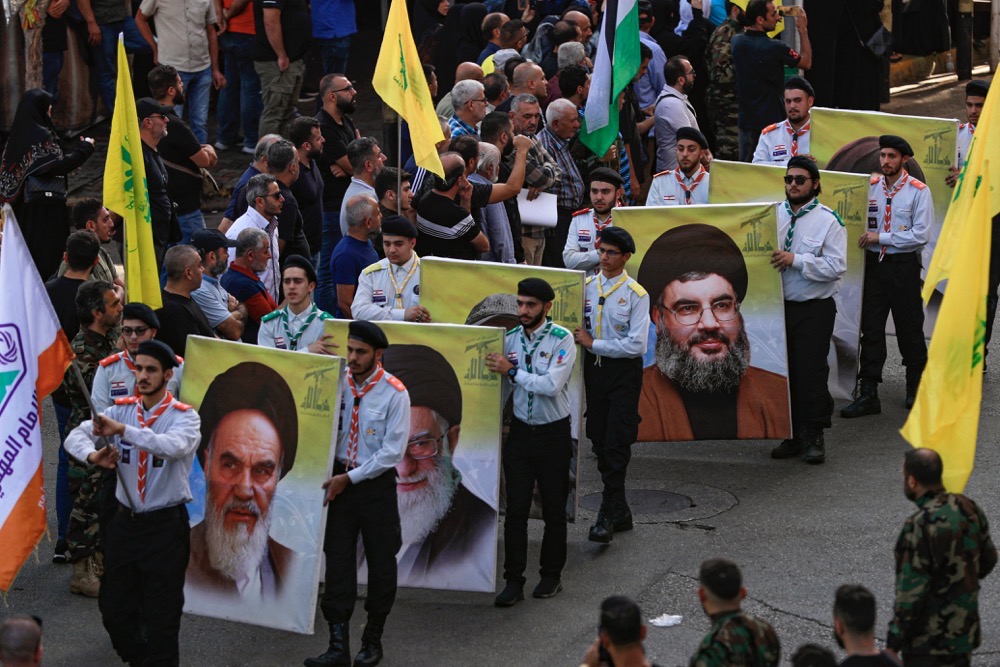
Nasrallah said American warships would neither deter nor scare his fighters and gave warning that if the US intervened directly in the war. (AFP)
“Watching the horror of the Israeli attack on Gaza, many Lebanese are reliving the nightmare of the destruction of their own country in the Israel-Hezbollah war of July-August 2006,” Lebanese economist Nadim Shehadi wrote in a recent opinion piece in Arab News.
Having already deployed two aircraft-carrier strike groups to the Eastern Mediterranean early in the siege of Gaza, led by the USS Gerald R. Ford and USS Dwight D. Eisenhower, the US has now sent an Ohio-class guided missile submarine to help deter a regional war.
“They (Hezbollah) are facing pressure from the ‘axis of resistance,’ like Hamas and other Palestinians, who believe that Hezbollah should play a leading role in the next phase,” Mohanad Hage Ali, a senior fellow at Carnegie Middle East Center, told Arab News.
Regardless of Hezbollah’s strategic calculations, the cost of the near-daily exchanges between its fighters and the IDF keeps rising steadily in both human and material terms.
On Sunday, a woman and three children were killed in an Israeli drone strike in southern Lebanon. Lebanon’s National News Agency said the four victims were the sister of a local radio correspondent and her three grandchildren, aged 10, 12 and 14.

The tit-for-tat attacks across the Lebanon-Israel border have raised concerns that Israel’s war on Hamas. (AFP)
Najib Mikati, Lebanon’s caretaker prime minister, condemned the Israeli attack as a “heinous crime” and said the government would file a complaint at the UN Security Council.
Shortly after the attack, Hezbollah said it fired Katyusha rockets at the northern Israeli town of Kiryat Shmona. In a statement, the group said it would not tolerate attacks on civilians and that its response would be “firm and strong.”
Earlier on Sunday, four rescue workers were injured in an Israeli bombing in southern Lebanon that hit two ambulances, according to state media.
“What is happening is ungodly, it’s evil, both in Gaza and the civilians who are dying here in Lebanon,” Ali, 43, a businessman from Dahieh, a predominantly Shiite suburb south of Beirut, told Arab News.
Since Oct. 7, at least 81 people have been killed on the Lebanese side in cross-border skirmishes, according to the AFP news agency. That figure includes 59 Hezbollah fighters.
Three of those deaths occurred on Sunday, according to Hezbollah sources.
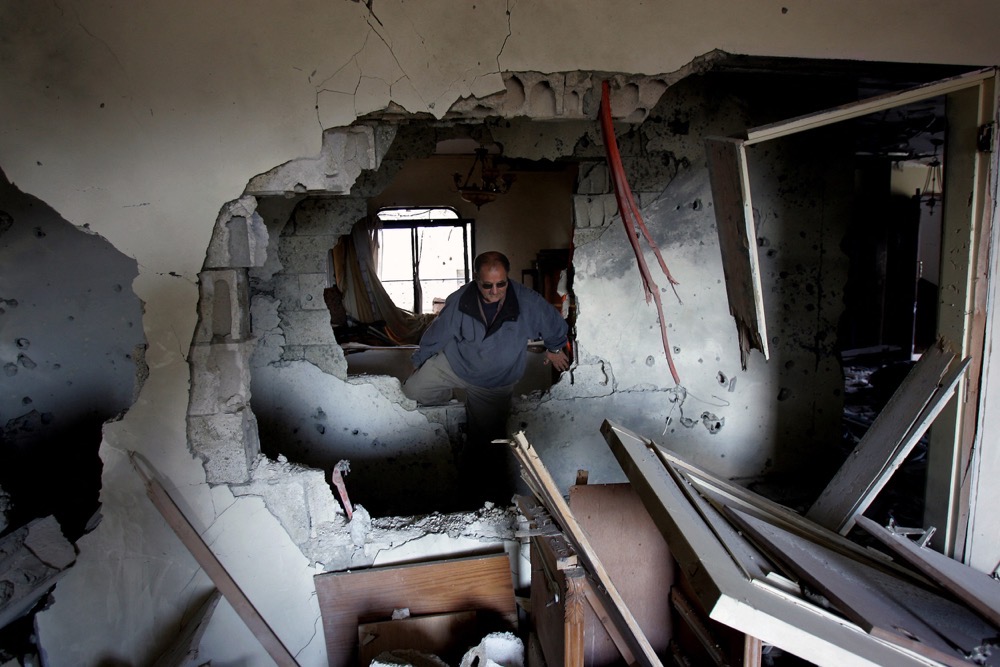
A Lebanese man is seen at his home destroyed during Israel’s summer offensive against Hezbollah. (AFP)
Meanwhile, six soldiers and two civilians have been killed on the Israeli side, according to IDF statements.
The tit-for-tat attacks across the Lebanon-Israel border, in spite of the presence of a UN peacekeeping force (UNIFIL) in the area, have raised concerns that Israel’s use of overwhelming force to destroy Hamas in Gaza could touch off a wider conflagration, drawing in not only Lebanon but also Syria, Iraq, Yemen and even Iran.
In his first speech since Israel’s siege of Gaza, Hezbollah chief Hassan Nasrallah on Friday warned Israel against the “folly” of an attack on Lebanon, with the rider that halting its “aggression against Gaza” would prevent a regional conflict.
He said Israel would be committing “the biggest foolishness in its history” if it launched an attack against his fighters. Benjamin Netanyahu, the Israeli prime minister, fired back with his own hyperbole: “Don’t test us. A mistake will exact a price you can’t even imagine.”
Opinion
This section contains relevant reference points, placed in (Opinion field)
Many of Nasrallah’s followers had expected him to announce during his speech that Hezbollah was going to become directly involved in the conflict instead of restricting its role to launching sporadic attacks.
However, the general consensus in Lebanon, reached on the basis of Nasrallah’s relatively cautious rhetoric, is that Hezbollah will not sacrifice blood and treasure in a war not directly related to the interests of the group or the Iranian regime.
“Those who oppose Hezbollah now will say: ‘See they didn’t defend the cause they claim,’” said Ali, the businessman. “And if he does join the war, they’ll say: ‘See, he dragged Lebanon into war.’”
Referring to a 2022 US-brokered deal between Lebanon and Israel, he said: “It is unfortunate because we were just starting to make some advancements with Washington, especially after the maritime border disputes they were brokering.
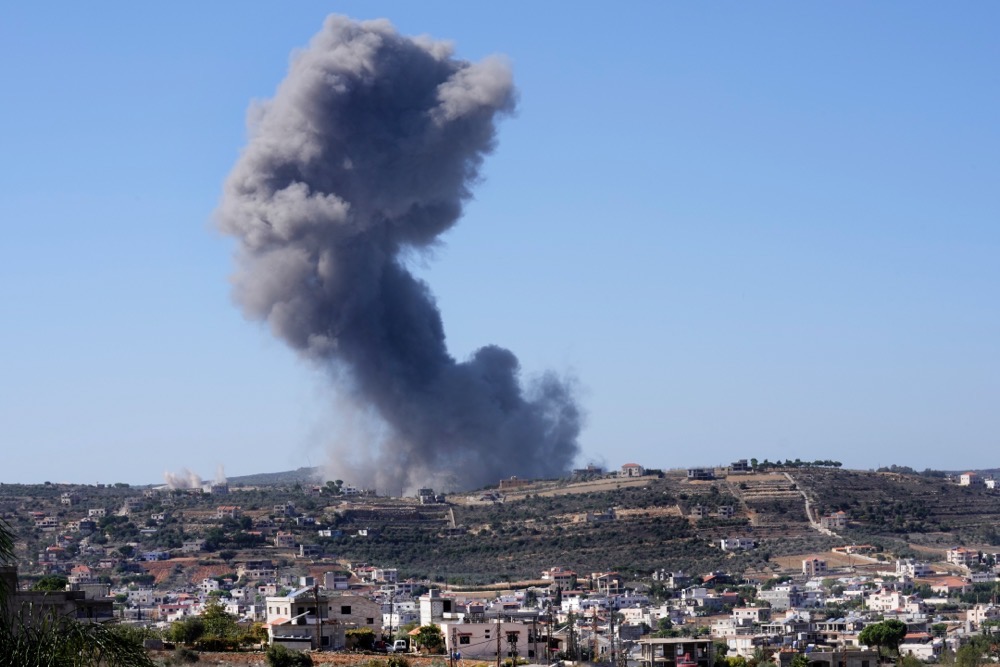
Black smoke rises from an Israeli airstrike on the outskirts of Aita Al-Shaab, a Lebanese border village with Israel. (AFP)
“Now it seems we’re back to square one.”
Nasrallah is the most prominent political figure in the “axis of resistance,” which consists of Iran-backed militias in Syria, Yemen, Iraq and Lebanon that share common anti-American and anti-Israeli sentiments and ideologies.
These militias presumably want to see Hezbollah escalate attacks on Israel in order to draw the IDF’s personnel and equipment away from the war effort against Hamas and slow its offensive in Gaza. But such a decision would not be without significant risks for both Hezbollah and Lebanon.
“If you look at it, it seems like Hezbollah has taken a governmental position,” said Hage Ali of the Carnegie Middle East Center.
“But at the same time, given its engagement in the conflict in the south of Lebanon with their attacks on Israeli positions, it seems like they are building up the ability to engage in a wider conflict.
INNUMBERS
• 4m People in need of humanitarian assistance, including 1.5m Syrians.
• 80% Lebanese living in poverty.
• 36% Lebanese living below extreme poverty line.
• 29.6% Unemployment rate (2022).
Source: World Bank, EU Commission
“They are under a lot of pressure. On one hand, they have the US threat to consider: If it intervenes, then Hezbollah will be on the receiving end of American strikes.
“On the other hand, there is pressure from Hezbollah’s Lebanese allies, friends and constituents, to step aside and spare Lebanon destruction that would have a long-term impact on the population.
“I think, strategically, Hezbollah will pay a heavy price if it stands aside and does not join the conflict in a wider scale of attacks against Israel. Either join now or be in a very difficult position in the next phase.”
In his speech on Friday, Nasrallah acknowledged the risks of a regional war but said Hezbollah, which is far better equipped than Hamas, with sophisticated and precise missiles alongside highly trained fighters, was prepared should tensions escalate.
“All the choices are available and we can resort to them anytime,” Nasrallah said.
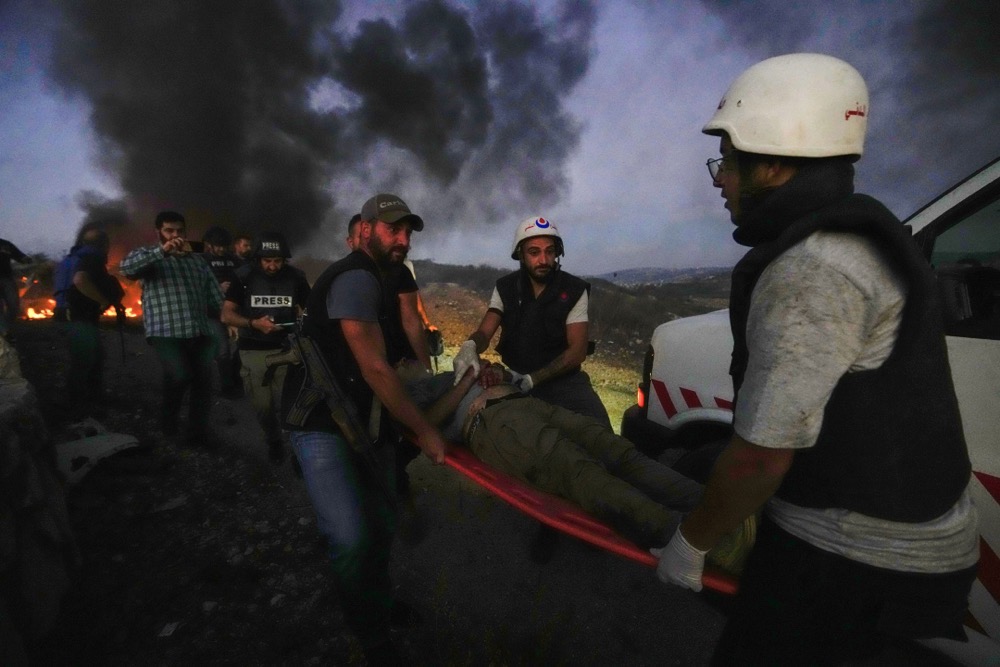
Civil Defence workers carry Qatar's Al-Jazeera TV cameraman Elie Brakhya who was injured by Israeli shelling. (AFP)
Hezbollah’s entry into the conflict, according to analysts, is likely to have a cascading effect, encouraging — if not compelling — its allies in Syria, Iraq, Yemen and Iran to join the fray, which would not bode well for Washington and its regional allies.
Just hours after Anthony Blinken, the US secretary of state, met with Iraq’s Prime Minister Mohammed Shia’ Al-Sudani in Baghdad over the weekend in a bid to prevent a widening of the war, an Iraqi Shiite militia launched four mortar rounds against American troops stationed at Al-Asad air base in western Iraq.
The attack was seen by political observers as intended to give American officials and military a taste of what to expect should the US become directly involved in a regional conflict on the side of Israel.
In his speech on Friday, Nasrallah said Yemen’s Houthis would continue to fire missiles northward and Iraqi militias would continue to target American bases in both Iraq and Syria.
Arab leaders have called on the US to support an immediate ceasefire and to allow the opening of a humanitarian corridor to help Palestinians trapped inside the embattled Gaza Strip, where more than 10,000 people have died in the past month, according to the Hamas-controlled health ministry.
During another meeting over the weekend between Blinken and Mikati in Amman, the Lebanese caretaker prime minister said that Israel must stop its “scorched earth” policy that is destroying human lives and towns.
While American officials have been publicly calling for the protection of civilians in Gaza, there has yet to be a call from Washington for a ceasefire.
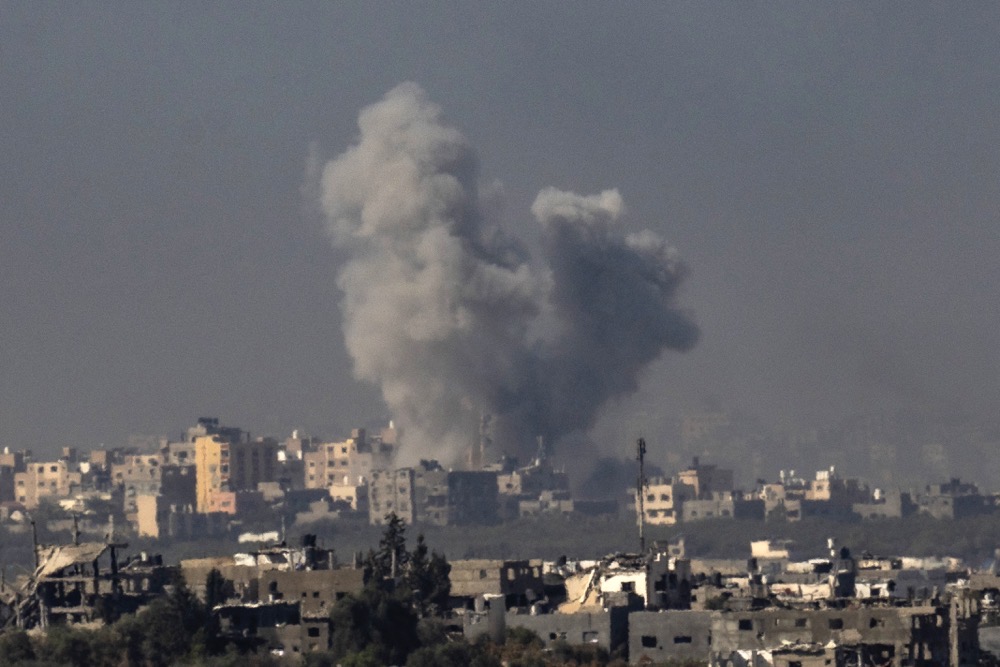
For now, the conflict between Hezbollah and Israel has not escalated beyond intermittent rocket fire and retaliatory strikes on the southern border. (AFP)
In Friday’s speech, Nasrallah said American warships would neither deter nor scare his fighters and gave warning that if the US intervened directly in the war, then Americans could expect attacks on their military bases in Syria, Iraq and elsewhere.
For now, the conflict between Hezbollah and Israel has not escalated beyond intermittent rocket fire and retaliatory strikes on the southern border.
However, a direct confrontation between the two sides would likely result in the displacement of hundreds of thousands of Lebanese civilians and cause irreparable harm to an economy in the grips of an unprecedented crisis.
“There is no good outcome for Lebanon: War will be destructive at a time when the country’s medical infrastructure is weak and its economy and banking system have collapsed,” economist Shehadi wrote in his opinion piece.
“The country will be turned into another Gaza with little prospect of recovery.”

















